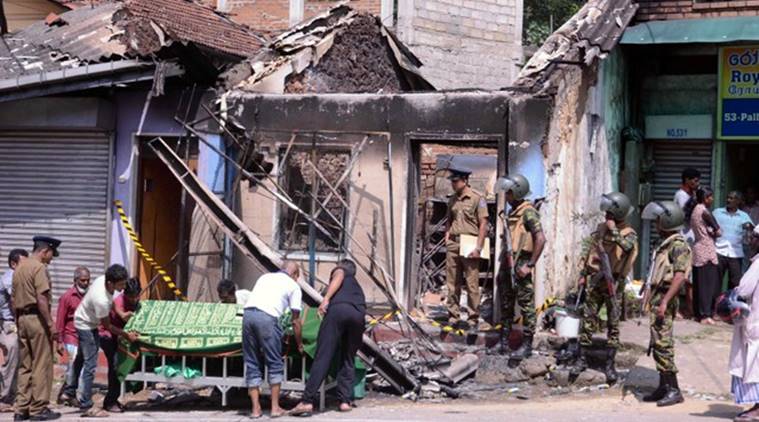Sri Lanka declares emergency
March 6, 2018 | Expert Insights

On Tuesday, the Sri Lankan government declared a state of emergency for 10 days due to religious clashes in the district of Kandy. The country has seen an escalation of religiously-motivated acts of violence in recent years.
Background
The Democratic Socialist Republic of Sri Lanka is an island nation in the Indian Ocean. Known until 1972 as Ceylon, the country has a rich cultural and historical background. The island saw the rise and fall of several kingdoms since 200 BCE before it was turned into a British colony in 1802. The country gained independence in 1948.
For 26 years, from 1983 to 2009, Sri Lanka was inundated by civil war while the government was engaged in conflict with the Liberation Tigers of Tamil Ealam (LTTE), a Tamil separatist terrorist organisation. Mahindra Rajapaksa is the president who saw the end of the civil war. He was thrown from power in the 2015 presidential elections by Sirisena, backed by the United National Party (UNP).
In February 2018, Sri Lanka’s local government elections gained attention. The elections did not see the violent run-up generally characteristic of Sri Lankan polls. However, the results took observers by surprise when the ruling coalition was defeated by Rajapaksa-backed SSLP (Sri Lanka Podujana Peramuna). This result was a blow to the ruling government, which was already rife with infighting.
As of 2017, Sri Lanka is home to an ethnically diverse population of 21.2 million people, including the majority Sinhalese (74.9%), as well as Sri Lankan Tamil, Sri Lankan Moors, and Indian Tamil peoples. Buddhism is the official religion of the country (70%), however Hindus (12.6%), Muslims (9.7%), and Roman Catholics (1.3%) are significant minorities.
Religious conflict has been a cause for concern in Sri Lanka in recent years. In 2014, the country saw the Aluthgama riots due to conflict between Buddhist and Muslim groups. Over four people were killed, and 80 people injured, a majority of whom were Muslim. These clashes were largely fuelled by hard-line Sinhalese Buddhist organisations such as the Bodu Bala Sena (BBS). The BBS is led by General Secretary Galagoda Atte Gnanasara.
Former President Rajapaksa has been criticized for allowing extremist Sinhalese and Buddhist organisations to rise during his presidency. In June 2017, a number of diplomats in Colombo condemned the escalating violence and called for the government to address the attacks.
Analysis
On Monday, a curfew was imposed in the central district of Kandy in Sri Lanka, after a Muslim-owned shop was set on fire by Sinhalese Buddhists. The ruling government has now imposed a state of emergency on the nation for 10 days.
Parliamentary spokesperson Dayasiri Jayasekara told Reuters, “At a special cabinet meeting, it was decided to declare a state of emergency for 10 days to prevent the spread of communal riots to other parts of the country.”
“It was also decided to take stern action against people who are instigating violence through Facebook,” he added.
Prime Minister Wickramsinghe said the violence “appeared to be systemic and organised” and promised to take action.
The executive director of the Centre for Human Rights Sri Lanka said that “unfathomable police inefficiency” is what caused the violence. Member of the National Front for Good Governance party in Sri Lanka Najah Mohamed told Al Jazeera, “We are facing the same situation that we had experienced with the previous government with tension, hate, and violence against Muslims are rampant especially where they are a dispersed community.”
Only last week, police were deployed in the town of Ampara when five people were wounded after a mob attacked a mosque and Muslim-owned shops. No arrests were made at the time, however the Muslim Council of Sri Lanka (MCSL) released a statement against the attacks, calling for the government to take action.
Analysts have noted that anti-Muslim and anti-Christian sentiments are on the rise amongst the general population. However, targeted attacks against minorities have increased in recent years, particularly since April 2017. Extremist Sinhalese-Buddhist nationalist groups have accused Muslims of vandalising Buddhist sites and forcing people to convert to Islam. These groups have also opposed the arrival of Rohingya refugees from Myanmar.
Alan Keenan, specialist with the International Crisis Group, expressed his belief that the rise of Sinhalese nationalism may also be linked to Rajapaksa’s growing support. “One of the key underlying elements is the sense that many Sinhalese and Buddhists have is that Sri Lanka is a Sinhalese and Buddhist island and other communities, Muslims and Tamils, are here on the sufferance of the majority,” he said.
Assessment
Our assessment is that Sri Lanka is seeing a rise of nationalism comparable to a number of other nations in the region. We believe that while it is essential for the government to quell violence, the declaration of emergency is not an effective or lasting solution. A number of groups have called for the ruling coalition to hold perpetrators of religiously-motivated violence accountable for their actions. The government must denounce the activities of extremist bodies such as the BBS in order for long term change.








Comments